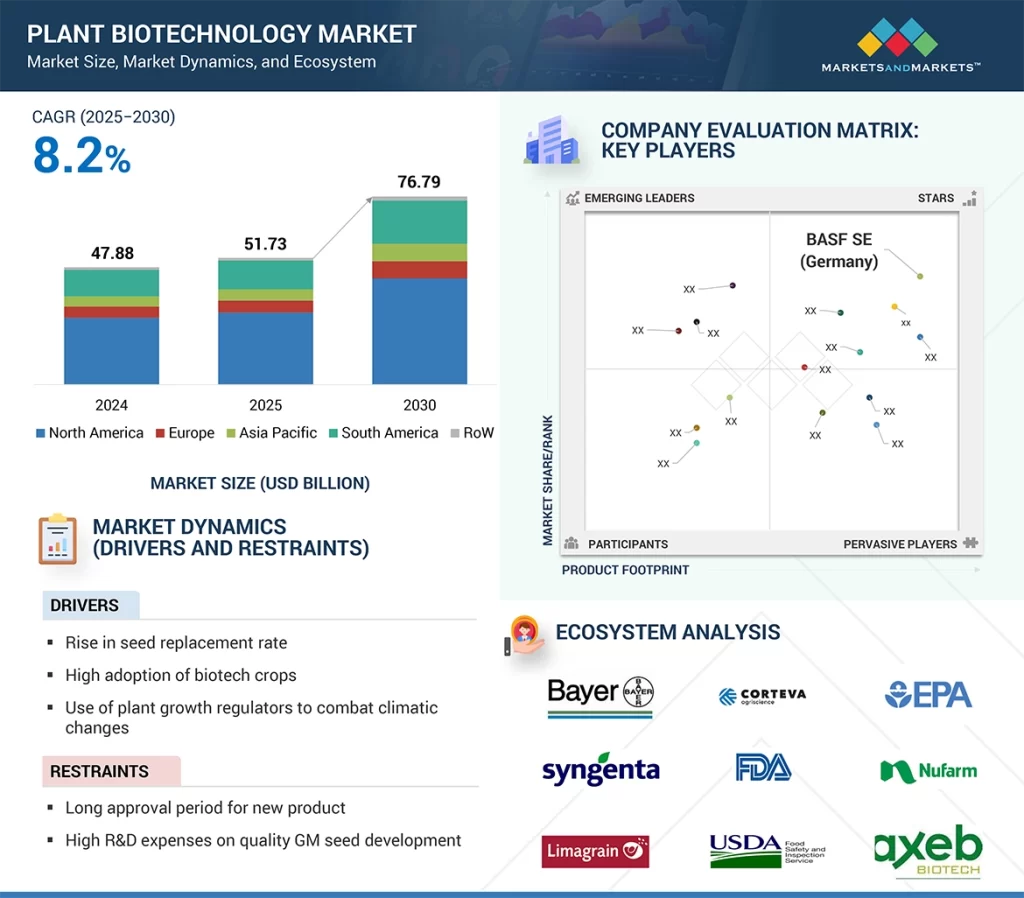The global plant biotechnology market is projected to grow from USD 51.73 billion in 2025 to USD 76.79 billion by 2030, at a CAGR of 8.2%. Advances in genetic engineering have revolutionized crop development, enabling the creation of genetically modified (GM) crops that boost agricultural productivity while maintaining environmental safety. These cutting-edge technologies address critical global food production challenges by fostering more sustainable and efficient farming solutions.

The future of agriculture is shaped by three key pillars: sustainability, scientific innovation, and the need for a habitable world. Beyond transforming food production, plant biotechnology is driving large-scale agricultural advancements. By bridging the gap between research and practical implementation, these innovations contribute to a more productive and sustainable agricultural system, meeting global nutritional demands.
Download PDF Brochure: https://www.marketsandmarkets.com/pdfdownloadNew.asp?id=225105561
Biopesticides Lead the Crop Protection & Nutrition Market in Plant Biotechnology
The biopesticides segment holds a substantial share in crop protection and nutrition solutions within plant biotechnology. Advances in biotechnology, such as RNA interference (RNAi) technology, have led to the development of customized, environmentally friendly pest control solutions. These innovations enhance the efficiency and diversity of biopesticides, reducing reliance on chemical pesticides.
The EU’s Farm to Fork Strategy aims to cut chemical pesticide use by 50% by 2030 (European Commission, 2020), further driving demand for biopesticides. A key development in this field is the use of genetically modified bacteria, fungi, and viruses as biocontrol agents against harmful pests. For instance, Bacillus thuringiensis (Bt) biopesticides produce insecticidal proteins that specifically target crop-damaging insects, minimizing the need for synthetic pesticides. Additionally, RNAi-based biopesticides silence essential pest genes, offering a highly precise and sustainable pest management strategy.
Fruits & Vegetables Segment Shows Strong Growth in the Plant Biotechnology Market
The demand for fruits and vegetables continues to grow globally, driven by population expansion, rising middle-class income, an established food industry, improved supply chains, and enhanced trade procedures. Fruits and vegetables, which include pome fruits, citrus fruits, leafy greens, root and tuber crops, and more, are irreplaceable dietary staples.
According to FAO, global fruit and vegetable production has surged, growing at an average annual rate of 3% over the past decade. The cultivation of vegetables, in particular, is expanding due to shorter growing cycles and higher profitability. The increasing adoption of commercial seeds in developing markets and advancements in seed technology in developed regions are fueling this growth. As vegetable consumption rises worldwide, the demand for biotech seeds is also increasing, with research-driven innovation encouraging farmers to invest in higher-value seed varieties.
Request for Sample Pages: https://www.marketsandmarkets.com/requestsampleNew.asp?id=225105561
South America’s Significant Role in the Plant Biotechnology Market
South America is a major player in the global GM crop industry, with Brazil and Argentina ranking among the top five adopters worldwide. As of 2023, over 90% of soybeans, corn, and cotton grown in these countries are genetically modified. Brazil alone cultivates over 55 million hectares of GM crops, primarily herbicide-tolerant soybeans and insect-resistant varieties (ISAAA, 2023). Argentina, which has embraced GM technology since the 1990s, grows nearly 100% genetically modified soy and cotton. Other nations, such as Paraguay, Uruguay, and Bolivia, also contribute significantly, particularly in soybean production.
South America’s pro-biotech policies and efficient approval processes facilitate rapid commercialization of new GM traits. Regulatory bodies like Brazil’s CTNBIO (National Biosafety Commission) and Argentina’s CONABIA (Advisory Commission on Agricultural Biotechnology) enable swift approvals, contrasting with Europe’s strict GMO regulations. As a result, GM crops are widely accepted among South American farmers and consumers.
Top 10 Companies in Plant Biotechnology Market
- BASF SE (Germany)
- Bayer AG (Germany)
- Corteva Agroscience (US)
- Syngenta AG (Switzerland)
- FMC Corporation (US)
- UPL (India)
- Sumitomo Chemical Co. Ltd. (Japan)
- Nufarm (Australia)
- Pro Farm Group (US)
- Limagrain (France)